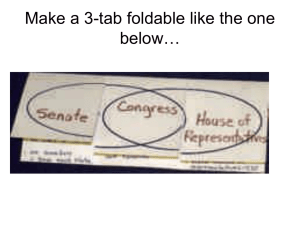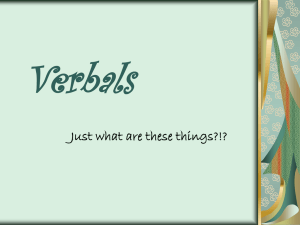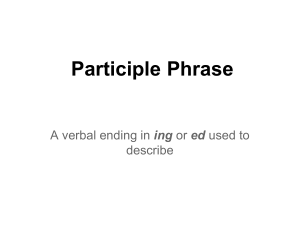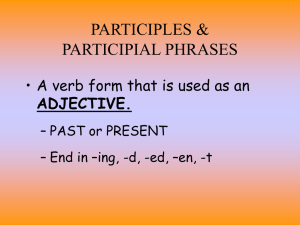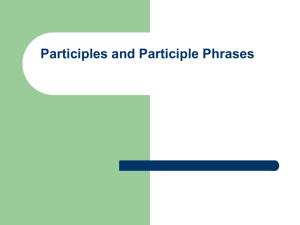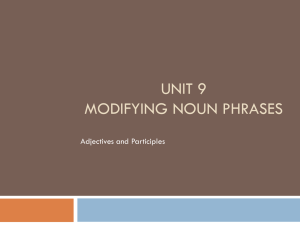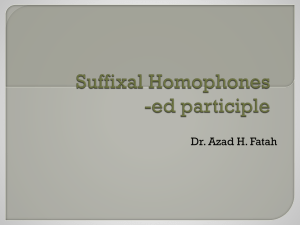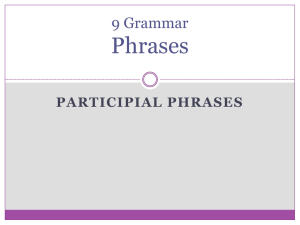Participles - Parma City School District
advertisement
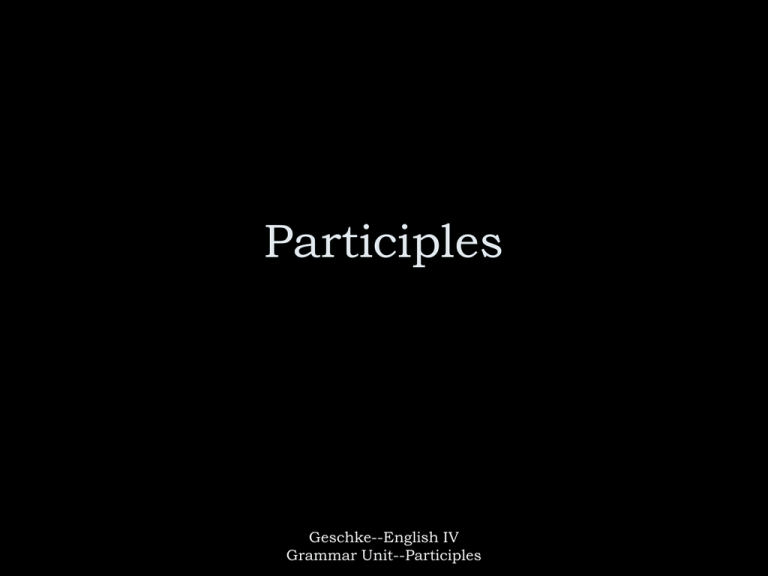
Participles Geschke--English IV Grammar Unit--Participles Verbals and Verbal Phrases • Verbals are forms of a verb that are used not as verbs but as other parts of speech. There chief function is to act as other parts of speech: adjectives, nouns, adverbs Three kinds of verbals • • – – – Participles Gerunds Infinitives Geschke--English IV Grammar Unit--Participles The Participle • • A participle is a verb form used as an adjective. Since the participle is part verb and part adjective, it can be called a “verbal adjective” Geschke--English IV Grammar Unit--Participles The Participle • Example – The simmering soup smelled scrumptious. • • Simmering is formed from the verb to simmer but also modifies the noun soup. Words formed from verbs and used as adjectives are called participles Geschke--English IV Grammar Unit--Participles The Participle • Examples – A chipped tooth hurts. • • Chipped is formed from the verb to chip but also modifies the noun tooth. Words formed from verbs and used as adjectives are called participles. Geschke--English IV Grammar Unit--Participles Types of Participles • There are two types of participles – – Present Participle Past Participle Geschke--English IV Grammar Unit--Participles Present Participles • Present participles consist of the plain form of the verb plus –ing. Example • – The annoying child refused to be quiet. • Annoying (formed by taking the plain form of the verb annoy and adding –ing) is a present participle modifying the noun child. Geschke--English IV Grammar Unit--Participles Present Participles • The present participle can also be part of a verb phrase – The students were laughing. • • Laughing is the present participle If a present participle is preceded by a helping verb (were), then it is considered to be part of the verb and not a separate adjective. Geschke--English IV Grammar Unit--Participles Past Participles • Past participles consist of the plain form of the verb plus –d or –ed. A few are formed irregularly. • – Examples • • Begin—began—begun Fly—flew—flown Geschke--English IV Grammar Unit--Participles Past Participles • Example – The scared girl cried when she saw the ghost. • Scared (formed by taking the plain form of the verb scare and adding –d) is a past participle modifying the noun girl. Geschke--English IV Grammar Unit--Participles Past Participles • Example – Pleased by the results, the teacher complemented the students. • Pleased (formed by taking the plain form of the verb please and adding –d) is a past participle modifying the noun teacher. Geschke--English IV Grammar Unit--Participles Past Participles • Like a present participle, a past participle can also be part of a verb phrase. Example • – He was pleased with the results. • Pleased (preceded by the helping verb was) is a past participle that is part of a verb phrase (was pleased). Geschke--English IV Grammar Unit--Participles Past Participles • Example – The girl was scared. • Scared (preceded by the helping verb was) is a past participle that is part of the verb phrase (was scared). Geschke--English IV Grammar Unit--Participles Assignment • Please rewrite the following sentences. After each sentence, list the participle and identify it as present or past. Finally, identify the noun or pronoun the participle modifies; if it is part of a verb phrase, please write VP. Be careful not to confuse participles with the main verb of the sentence. Geschke--English IV Grammar Unit--Participles Assignment 1. He has an undeserved reputation. 2. Desiring to change this perception, he decided to volunteer his time. 3. He debated about which organization would be receiving his services. 4. Seeking something different and unique, he chose the Humans for Dragons Organization. 5. The Humans for Dragons Organization provides safe homes to rehabilitating stallions. Geschke--English IV Grammar Unit--Participles Assignment 6. After much experience, he realized that he was making the correct decision. 7. These dragons needed his help. 8. Founded in 2006, this Organization continues to grow. 9. As of today, the Organization has helped over five hundred dragons. 10. Without people like him, these smiling dragons would not survive. Geschke--English IV Grammar Unit--Participles

